
Bournemouth University students, Georgia Robertson and Jordan Ezra, will be presenting their research in Westminster as part of the annual ‘Posters in Parliament’ event. Around 40 undergraduates from universities all over the UK will be presenting their research to politicians, policy makers and fellow students.
As a country, we face a number of big challenges – energy provision, health and wellbeing, as well as issues such as sustainability – all of which research can help solve. Posters in Parliament is designed celebrate the research of some of the UK’s undergraduates, as well as highlighting the achievements of the next generation of researchers, some of whom may well go on to tackle some of our biggest challenges.
Georgia Robertson, an Events & Leisure Marketing student, will be presenting her research into business-to-business marketing, which she began while on her placement year.
“Over the years, email marketing has developed a negative stigma, perhaps because of an increase in unsolicited contact in an attempt to generate businesses leads. These are known as lead generation emails. This stigma has led to a dramatic drop in engagement in business-to-business email marketing campaigns, which means it’s important for those involved in the campaigns to know how to optimise their success,” explains Georgia.
“I analysed data from over 500 lead generation email campaigns from my placement to see which variables influenced the success of those campaigns. These included the subject line, email content and the links in the email. By exploring these variables, I was able to identify the factors that led to success in email marketing campaigns, which I hope will be useful to businesses trying convert email contacts into customers.”
Jordan Ezra is a Digital Media Design student. For his final year dissertation, he chose to explore the gradual dissolution of human rights by different world governments and intelligence agencies.
“I’m interested in current world events and particularly how the erosion of human rights has been justified by events of the last 20 years. My research has shown that it’s becoming more difficult to tell the truth – an interesting conclusion, given the rise of ‘fake news’ stories,” says Jordan.
“By analysing events of the last 20 years, I found that legislation across the world is limiting our human rights through increased surveillance and co-operation with corporations, among other issues. My analysis showed that the justification for this dissolution is related to events such as September 11 Twin Towers attacks and subsequent war on terror. There’s an increasingly blurred line between privacy and security, which is beginning to spark debates around the need for more transparent democracies.”
Georgia and Jordan will be presenting their research in Parliament on 14 March. Posters in Parliament is part of the British Conference of Undergraduate Research (BCUR), which Bournemouth University will be hosting in April. If you’d like to attend and support some of the BU students presenting their research at BCUR, please register on Eventbrite here.
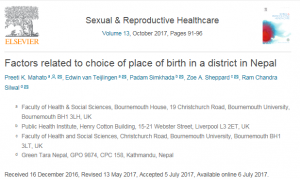 Congratulations to Preeti Mahato, PhD student in the Centre for Midwifery, Maternal & Perinatal Health, on the publication of her latest paper ‘Factors related to choice of place of birth in a district in Nepal’ in the Elsevier journal Sexual & Reproductive Healthcare [1]. The paper based on her research work in Nawalparasi, southern Nepal. This new paper is the third paper form Preeti’s PhD work [2-3].
Congratulations to Preeti Mahato, PhD student in the Centre for Midwifery, Maternal & Perinatal Health, on the publication of her latest paper ‘Factors related to choice of place of birth in a district in Nepal’ in the Elsevier journal Sexual & Reproductive Healthcare [1]. The paper based on her research work in Nawalparasi, southern Nepal. This new paper is the third paper form Preeti’s PhD work [2-3]. esearch, (led by me, Dr Paul Hartley), was recognised at UK Kidney Week in Liverpool last week. We were invited to speak about our fruit fly model of human renal disease, work that has been variously supported by grants from the British Heart Foundation and Kidney Research UK. The conference was an excellent opportunity to showcase the model and highlight our current collaborations with consultant-scientists based at Great Ormond Street Children’s Hospital as well as a number of different groups at the University of Bristol, the University of Osnabruck in Germany, Harvard Children’s Hospital and the University of Edinburgh. The research work is based in Dorset House labs and is supported by a wide network of talented people within BU as well as our undergrad and post-grad students.
esearch, (led by me, Dr Paul Hartley), was recognised at UK Kidney Week in Liverpool last week. We were invited to speak about our fruit fly model of human renal disease, work that has been variously supported by grants from the British Heart Foundation and Kidney Research UK. The conference was an excellent opportunity to showcase the model and highlight our current collaborations with consultant-scientists based at Great Ormond Street Children’s Hospital as well as a number of different groups at the University of Bristol, the University of Osnabruck in Germany, Harvard Children’s Hospital and the University of Edinburgh. The research work is based in Dorset House labs and is supported by a wide network of talented people within BU as well as our undergrad and post-grad students.
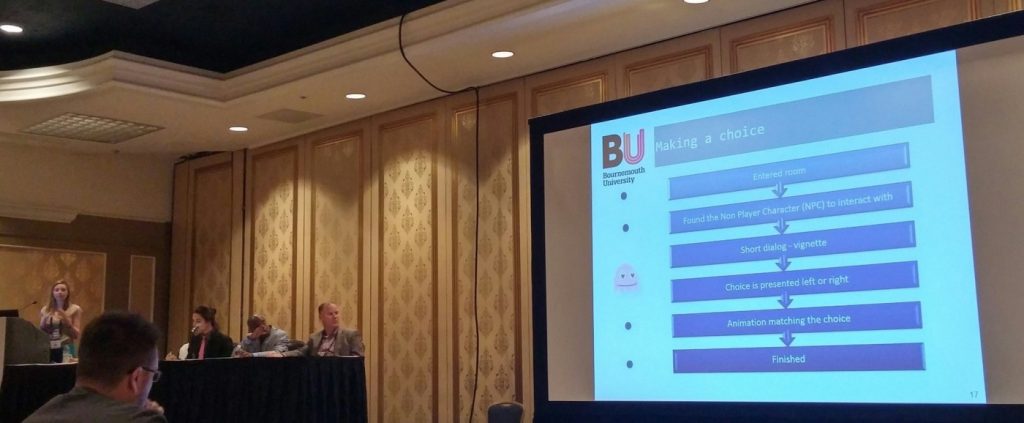 student paper. The research presented was funded by the University Student Research Assistant (SRA) scheme, which involved collaboration between departments and faculties. The research involved creating a game to measure in-game moral decisions. The research team included Jacqui Taylor and John McAlaney from the Department of Psychology, Davide Melacca and Christos Gatzidis from the Department of Creative Technology, and Eike Anderson from the National Centre for Computer Animation.
student paper. The research presented was funded by the University Student Research Assistant (SRA) scheme, which involved collaboration between departments and faculties. The research involved creating a game to measure in-game moral decisions. The research team included Jacqui Taylor and John McAlaney from the Department of Psychology, Davide Melacca and Christos Gatzidis from the Department of Creative Technology, and Eike Anderson from the National Centre for Computer Animation.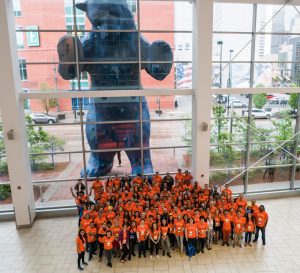
 volunteers with their duties. Sarah found it to be a great experience and highly recommends other students to consider being a student volunteer as a great chance to network and it also helps with funding conferences as the registration fee was waived.
volunteers with their duties. Sarah found it to be a great experience and highly recommends other students to consider being a student volunteer as a great chance to network and it also helps with funding conferences as the registration fee was waived.

 Have a
Have a  We’re waiting for your applications for ESRC Festival of Social Science until 5 pm on Friday 5th May.
We’re waiting for your applications for ESRC Festival of Social Science until 5 pm on Friday 5th May.
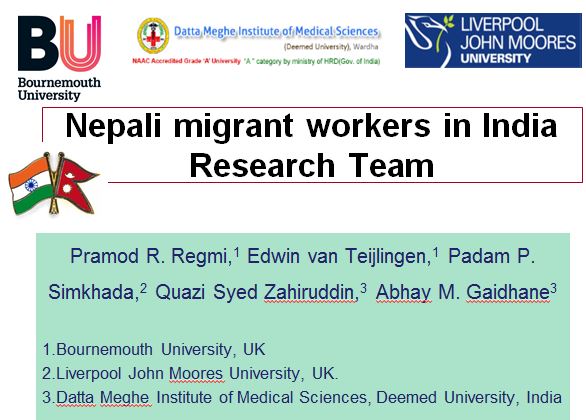


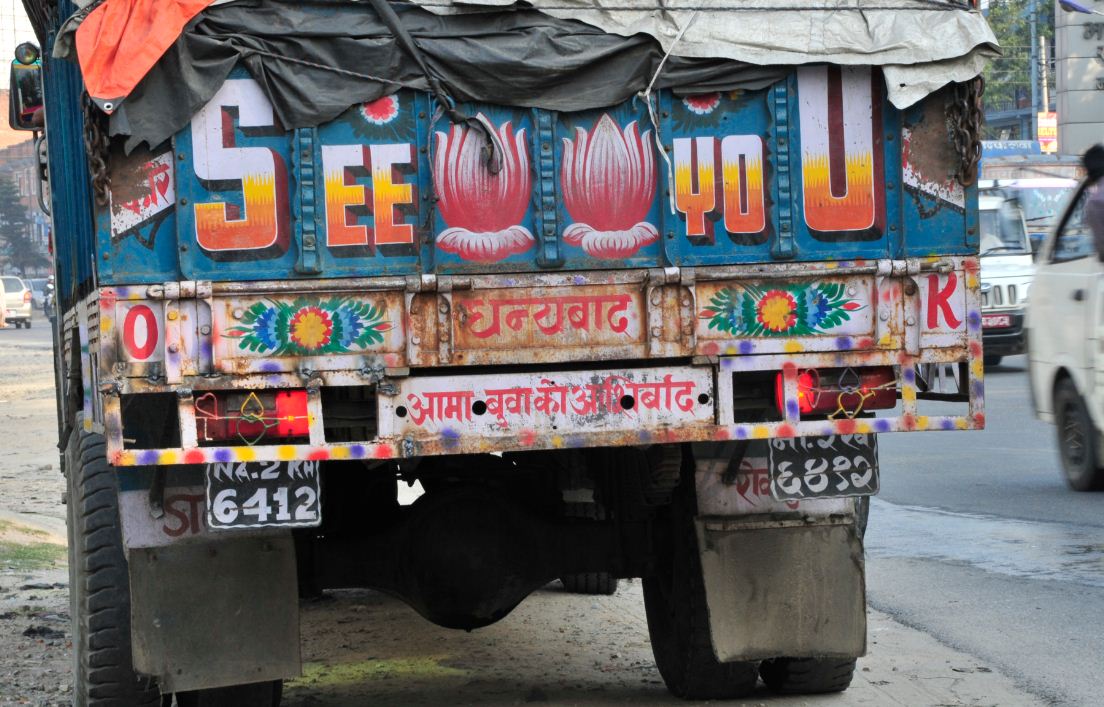

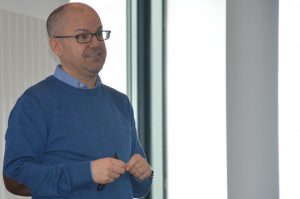
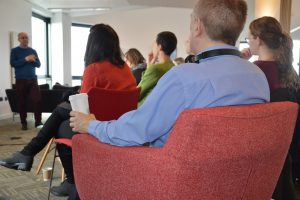

















 From Sustainable Research to Sustainable Research Lives: Reflections from the SPROUT Network Event
From Sustainable Research to Sustainable Research Lives: Reflections from the SPROUT Network Event REF Code of Practice consultation is open!
REF Code of Practice consultation is open! BU Leads AI-Driven Work Package in EU Horizon SUSHEAS Project
BU Leads AI-Driven Work Package in EU Horizon SUSHEAS Project ECR Funding Open Call: Research Culture & Community Grant – Apply now
ECR Funding Open Call: Research Culture & Community Grant – Apply now ECR Funding Open Call: Research Culture & Community Grant – Application Deadline Friday 12 December
ECR Funding Open Call: Research Culture & Community Grant – Application Deadline Friday 12 December MSCA Postdoctoral Fellowships 2025 Call
MSCA Postdoctoral Fellowships 2025 Call ERC Advanced Grant 2025 Webinar
ERC Advanced Grant 2025 Webinar Update on UKRO services
Update on UKRO services European research project exploring use of ‘virtual twins’ to better manage metabolic associated fatty liver disease
European research project exploring use of ‘virtual twins’ to better manage metabolic associated fatty liver disease